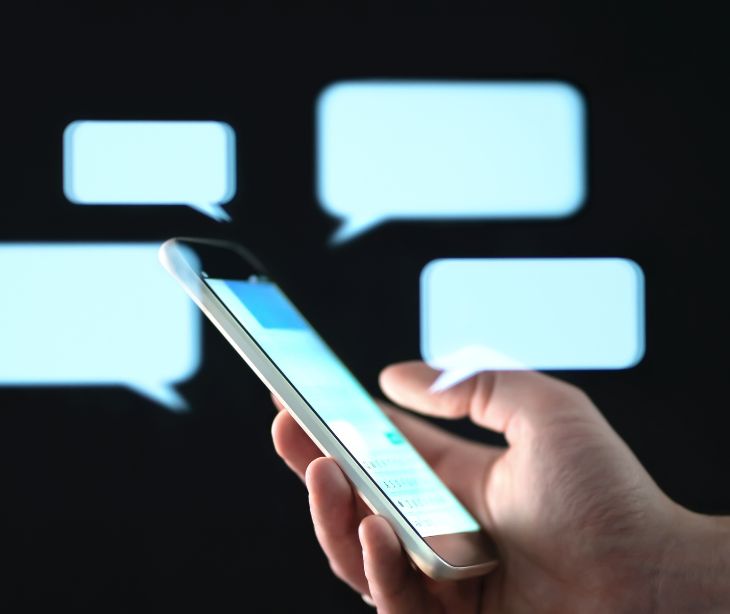3 min read
Adding credibility to text messaging campaigns in healthcare
Kirsten Peremore
March 5, 2024

A recent study shows that 98% of patients like receiving text messages from their care team. Yet, without ensuring the credibility of these messages, there's a risk that health advisories could be ignored or mistaken for fraudulent attempts. By implementing measures to authenticate and ensure HIPAA compliant text messaging, healthcare providers can maintain this trust.
Digital certificates for authentication
Digital certificates serve as electronic passports that establish the credentials of the sender of digital messages. When used in healthcare text messaging, they authenticate the identity of the healthcare provider sending the message, ensuring the communication is from a trusted and verified source. This authentication process improves the credibility of the messages, as recipients can be confident that the information they are receiving is indeed from their healthcare provider and not a fraudulent source.
See also: Text Messaging and HIPAA for home healthcare providers
Blockchain for data integrity
In this approach, each text message would be recorded as a block of data on a blockchain, linking it securely to the preceding and subsequent messages, creating a tamper-evident chain. This method ensures that once a message is entered into the blockchain, it cannot be altered or deleted, guaranteeing the authenticity and integrity of the information sent to patients. The relevance of blockchain to the credibility of text messages lies in its ability to provide a verifiable and secure record of communication. Patients, granted access to this blockchain or provided with a secure way to verify the messages, can trust that the information they receive has not been tampered with and is indeed from a verified healthcare provider.
Rich Communication Services (RCS)
(RCS) is a communication protocol designed to enhance traditional SMS text messaging with a rich set of features, including high-resolution photo and video sharing, group chat capabilities, read receipts, and message typing indicators. The protocol itself is designed to operate across all carriers and phones, making it a universal standard for text messaging. For healthcare organizations, RCS can boost the credibility of text messages by providing a verified sender identity. This means that messages sent to patients come with a clear indication that they are from a legitimate and verified healthcare provider, reducing the risk of fraud and enhancing patient trust. Additionally, the rich media capabilities allow for more informative and engaging messages, such as sending images or videos to explain medical procedures or health advice, further improving the effectiveness and reliability of communication.
Secure message escrow with time-limited access
Implementing a secure message escrow system with time-limited access revolutionizes the way sensitive information is shared via text messaging, particularly in contexts requiring high security, such as healthcare communication. Instead of sending sensitive data directly through a text message, this method securely stores the information online. The text message sent to the recipient contains a link to access this information. Access to the data is meticulously controlled using time-limited, single-use tokens, ensuring that the information can only be accessed for a short, predefined period and solely by the intended recipient. This approach enhances the security and privacy of the transmitted information, as it minimizes the risk of unauthorized access or data breaches.
Machine learning for personalization and security
By analyzing patient data and preferences, machine learning algorithms can tailor messages to individual needs, making the communication more relevant and engaging for patients. This personalization demonstrates a healthcare provider's commitment to addressing each patient's unique health concerns, thereby enhancing trust and credibility. Additionally, machine learning enhances the security of messaging systems by identifying and preventing fraudulent activities. It can detect unusual patterns that may indicate a security breach or an attempt to send misleading information, ensuring that only legitimate and safe messages reach patients. This dual application of machine learning not only protects patients from potential harm but also reinforces their confidence in the digital communication they receive from their healthcare providers.
See also: How HIPAA compliant texting improves patient outcomes
FAQs
Why is it important to include contact information in healthcare text messages?
Including a way for patients to verify information or ask questions—such as a contact number or website link—adds a layer of transparency and accountability, further boosting the credibility of the text messaging campaign.
Which factors affect the credibility of text messaging campaigns?
Obtaining explicit consent before sending text messages respects patient privacy and autonomy, demonstrating a healthcare provider's ethical practices and thereby enhancing the campaign's credibility.
In what ways can feedback from patients contribute to the credibility of text messaging campaigns?
Actively seeking and responding to patient feedback shows a commitment to continuous improvement and patient satisfaction. This responsiveness can improve the perceived trustworthiness and effectiveness of text messaging campaigns.
Subscribe to Paubox Weekly
Every Friday we bring you the most important news from Paubox. Our aim is to make you smarter, faster.




